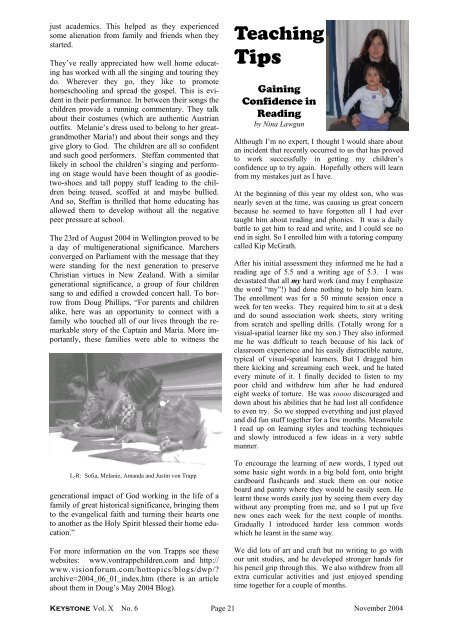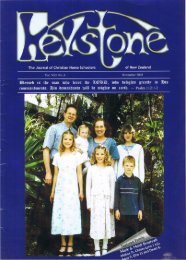But one thing I do - Home Education Foundation
But one thing I do - Home Education Foundation
But one thing I do - Home Education Foundation
You also want an ePaper? Increase the reach of your titles
YUMPU automatically turns print PDFs into web optimized ePapers that Google loves.
just academics. This helped as they experienced<br />
some alienation from family and friends when they<br />
started.<br />
They’ve really appreciated how well home educating<br />
has worked with all the singing and touring they<br />
<strong>do</strong>. Wherever they go, they like to promote<br />
homeschooling and spread the gospel. This is evident<br />
in their performance. In between their songs the<br />
children provide a running commentary. They talk<br />
about their costumes (which are authentic Austrian<br />
outfits. Melanie’s dress used to belong to her greatgrandmother<br />
Maria!) and about their songs and they<br />
give glory to God. The children are all so confident<br />
and such good performers. Steffan commented that<br />
likely in school the children’s singing and performing<br />
on stage would have been thought of as goodietwo-shoes<br />
and tall poppy stuff leading to the children<br />
being teased, scoffed at and maybe bullied.<br />
And so, Steffan is thrilled that home educating has<br />
allowed them to develop without all the negative<br />
peer pressure at school.<br />
The 23rd of August 2004 in Wellington proved to be<br />
a day of multigenerational significance. Marchers<br />
converged on Parliament with the message that they<br />
were standing for the next generation to preserve<br />
Christian virtues in New Zealand. With a similar<br />
generational significance, a group of four children<br />
sang to and edified a crowded concert hall. To borrow<br />
from Doug Phillips, “For parents and children<br />
alike, here was an opportunity to connect with a<br />
family who touched all of our lives through the remarkable<br />
story of the Captain and Maria. More importantly,<br />
these families were able to witness the<br />
L-R: Sofia, Melanie, Amanda and Justin von Trapp<br />
generational impact of God working in the life of a<br />
family of great historical significance, bringing them<br />
to the evangelical faith and turning their hearts <strong>one</strong><br />
to another as the Holy Spirit blessed their home education.”<br />
For more information on the von Trapps see these<br />
websites: www.vontrappchildren.com and http://<br />
www.visionforum.com/hottopics/blogs/dwp/?<br />
archive=2004_06_01_index.htm (there is an article<br />
about them in Doug’s May 2004 Blog).<br />
Teaching<br />
Tips<br />
Gaining<br />
Confidence in<br />
Reading<br />
by Nina Lawgun<br />
Although I’m no expert, I thought I would share about<br />
an incident that recently occurred to us that has proved<br />
to work successfully in getting my children’s<br />
confidence up to try again. Hopefully others will learn<br />
from my mistakes just as I have.<br />
At the beginning of this year my oldest son, who was<br />
nearly seven at the time, was causing us great concern<br />
because he seemed to have forgotten all I had ever<br />
taught him about reading and phonics. It was a daily<br />
battle to get him to read and write, and I could see no<br />
end in sight. So I enrolled him with a tutoring company<br />
called Kip McGrath.<br />
After his initial assessment they informed me he had a<br />
reading age of 5.5 and a writing age of 5.3. I was<br />
devastated that all my hard work (and may I emphasize<br />
the word “my”!) had d<strong>one</strong> no<strong>thing</strong> to help him learn.<br />
The enrollment was for a 50 minute session once a<br />
week for ten weeks. They required him to sit at a desk<br />
and <strong>do</strong> sound association work sheets, story writing<br />
from scratch and spelling drills. (Totally wrong for a<br />
visual-spatial learner like my son.) They also informed<br />
me he was difficult to teach because of his lack of<br />
classroom experience and his easily distractible nature,<br />
typical of visual-spatial learners. <strong>But</strong> I dragged him<br />
there kicking and screaming each week, and he hated<br />
every minute of it. I finally decided to listen to my<br />
poor child and withdrew him after he had endured<br />
eight weeks of torture. He was soooo discouraged and<br />
<strong>do</strong>wn about his abilities that he had lost all confidence<br />
to even try. So we stopped every<strong>thing</strong> and just played<br />
and did fun stuff together for a few months. Meanwhile<br />
I read up on learning styles and teaching techniques<br />
and slowly introduced a few ideas in a very subtle<br />
manner.<br />
To encourage the learning of new words, I typed out<br />
some basic sight words in a big bold font, onto bright<br />
cardboard flashcards and stuck them on our notice<br />
board and pantry where they would be easily seen. He<br />
learnt these words easily just by seeing them every day<br />
without any prompting from me, and so I put up five<br />
new <strong>one</strong>s each week for the next couple of months.<br />
Gradually I introduced harder less common words<br />
which he learnt in the same way.<br />
We did lots of art and craft but no writing to go with<br />
our unit studies, and he developed stronger hands for<br />
his pencil grip through this. We also withdrew from all<br />
extra curricular activities and just enjoyed spending<br />
time together for a couple of months.<br />
Keyst<strong>one</strong> Vol. X No. 6 Page 21 November 2004








